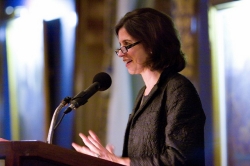Like countless other women, we’ve been closely following the Obama administration’s attempt to compel religious institutions to provide contraceptive coverage in violation of their beliefs. And like countless other women, over the past several days we’ve heard House Minority Leader Nancy Pelosi and others repeatedly ask those who oppose the contraceptive mandate, “Where are the women?”
Here we are.
We listened to prominent women purport to speak for us. We watched them duck the fundamental religious-liberty issues at stake. And we saw them assume that all women view cheaper contraceptives and abortion-causing drugs as unqualified goods.
In response, we circulated an open letter to a few dozen of our female friends in support of the competing voice offered by Catholic institutions on matters of sex, marriage, and family life. The letter spread, and in 72 hours we received some 750 signatures from a diverse group of women across the country, including women serving overseas. Signatures are still flooding in. Doctors, nurses, lawyers, teachers, mothers, business owners, community volunteers, scholars — women from all walks of life are proud to stand together with the Catholic Church and its invaluable witness.
Most of us are Catholic, but some are not. We are Democrats, Republicans, and independents. Many work or have worked for a Catholic institution. We are proud to have been associated not only with the work that Catholic institutions perform in the community — particularly for the most vulnerable — but also with the shared sense of purpose found among colleagues who chose their job because, in a religious institution, a job is also a vocation.
To a woman, we are deeply troubled by the mandate’s violation of fundamental religious-liberty protections. Detailed analyses of the First Amendment and the Religious Freedom Restoration Act issues at stake here have already appeared in these pages. But we note that under RFRA, the government cannot substantially burden religious freedom unless the burden furthers a compelling government interest and is the “least restrictive” means of furthering that interest. Yet in the face of widespread opposition, the Obama administration was able to quickly revise the mandate to a version it (wrongly) considers “less restrictive” than its original proposal. That tells you all you need to know about how seriously the administration took its obligation to abide by RFRA in the first place.
Those who invoke “women’s health” against those of us who disagree with forcing religious institutions or individuals to violate deeply held beliefs are more than a little mistaken — and more than a little dishonest. Even setting aside their simplistic equation of “costless” birth control with “equality” and “women’s health,” note that they have never responded to the large body of scholarly research indicating that many forms of contraception have serious side effects; or that some contraceptives destroy embryos; or that government contraceptive programs inevitably change the sex, dating, and marriage markets in ways that lead to more empty sex, more non-marital births, and more abortions. It is women who suffer disproportionately when these things happen.
No one speaks for all women on these issues. Those who purport to do so are simply attempting to deflect attention from the serious religious-liberty issues at stake. We are proud to stand with the Catholic Church and its rich, life-affirming teachings on sex, marriage, and family life. We call on President Obama, Health and Human Services Secretary Kathleen Sebelius, and our representatives in Congress to respect religious voices, to respect religious liberty, and to allow religious institutions and individuals to continue to provide witness to their faiths in all their fullness.
By Helen M. Alvare & Kim Daniels
— Helen M. Alvaré is an associate professor of law at George Mason University School of Law, the chair of the Witherspoon Task Force on Conscience Protection, and a consultant to the Pontifical Council for the Laity. Kim Daniels is former counsel to the Thomas More Law Center, where she focused on health-care rights of conscience. Visit womenspeakforthemselves.com to sign the letter yourself.






